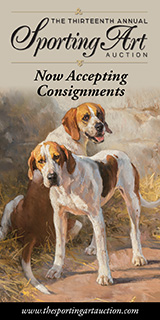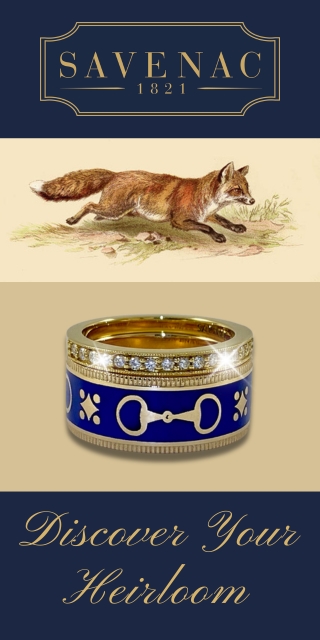Red Rock Hounds
Lassie, Come Home
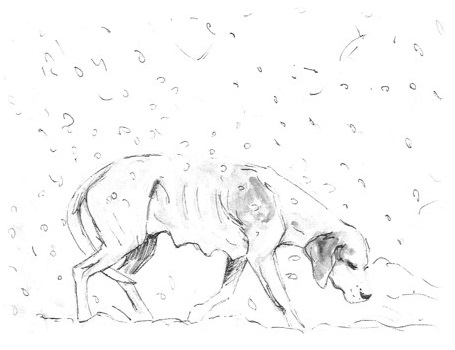 Halo: two years getting home / Illustration by Rosemary Coates
Halo: two years getting home / Illustration by Rosemary Coates
From The Hound Intelligence Series, published by Hounds Magazine (UK), edited by Deirdre Hanna, illustrated by Rosemary Coates. Click to purchase the 333-page collection.
Red Rock Halo by Lynn Lloyd, MFH
Years ago, in the mid-1980s, the Red Rock Hounds (NV) hunted an area in Northern California called Spencerville. The drive from Reno takes about four hours and crosses a mountain pass exceeding fourteen thousand feet at the summit. Here in Reno, we are about 5,500 feet above sea level, so the climb is substantial, and the range is vast. It is the same Sierra-Nevada range and the same pass (now Interstate 80) where the doomed Donner Party met their fate over the winter of 1846/1847 when they became snowbound migrating westward.
De La Brooke Tops Hunts in 2020 USPC Foxhunting Challenge
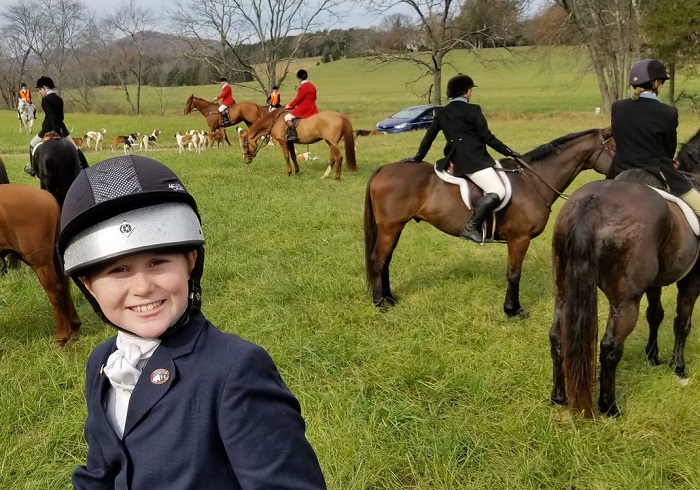
De La Brooke Pony Club topped seven North American Pony Clubs in the annual United States Pony Club Foxhunting Challenge Award. Marty and Daphne Wood, Joint-Masters of the Live Oak Hounds (FL), established and funded the annual Challenge Award to reward those Pony Clubs and hunts across North America that work together proactively in giving Pony Clubbers the opportunity to foxhunt.
Last season seven Pony Clubs and their local hunts accepted the Challenge, accounting for more than 420 days in the hunting fields for the young riders. In order of the Award placings, the Pony Clubs are: De La Brooke Pony Club, hunting with the De La Brooke Foxhounds (MD); St. Margaret’s, hunting with the Marlborough Hunt (MD); Ochlockonee, hunting with the Live Oak Hunt (FL); Blue Mountain, hunting with the Rose Tree-Blue Mountain Hunt (PA); Old Dominion, hunting with the Old Dominion Hounds (VA); Cedar Knob, hunting with the Cedar Knob Hounds (TN); and Portneuf Valley, hunting with the Red Rock Hounds (NV). The top participating Pony Clubs receive cash awards donated by the Woods.
In the Path of a Wildfire
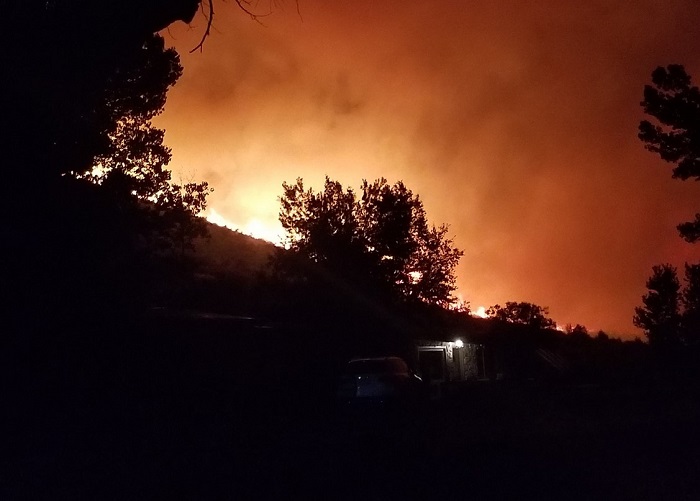 The wildfire tops the final ridge before descending into the valley toward the Red Rock Hounds kennels, stables, and homes, from where this photo was shot. / Joy Smith photo
The wildfire tops the final ridge before descending into the valley toward the Red Rock Hounds kennels, stables, and homes, from where this photo was shot. / Joy Smith photo
“A huge scare. That’s for sure,” said Angela Murray, MFH and huntsman, Red Rock Hounds (NV).
After many hot and blistering weeks the sagebrush had turned to dry tinder for miles around, just waiting for a spark. On August 2, 2020 the wait was over. A car blew a tire on the north-south freeway 395 about ten miles west of the ranch that is home to the Red Rock Hounds. The spinning rim of the wheel hit the pavement and sparks flew. The sagebrush caught fire, spread, and with windy conditions for encouragement headed east from the freeway and over the first mountain range.
The “O” Boys
Red Rock Master and huntsman Angela Murray with her “O” boys, (l-r) Oslo and Oops / Nancy Stevens-Brown photo Just before the start of the current season, Nancy Stevens-Brown shot this photo of Master and huntsman Angela Murray, Red Rock Hounds (NV), telling two of her up-and-coming “O” boys that hunt season is only weeks away. Oh, boy, were they ready! The two young dog hounds, Oslo and Oops, were unentered two-year-olds from a litter of six drafted from Walter Epp, the gentleman who started Red Rock founder and Master Lynn Lloyd with her Walker hounds. “They’re all rock stars,” says Angela. She reports that the pair are hunting brilliantly and maturing into what she hopes to be incredible breeding stock for the pack. Masters and staff are in love with the drive, stamina, grit and biddability of their “O” boys, and Oslo now has a litter on the ground. Posted March 16, 2020
Read More
Performance Trial a Home Run at Mission Valley
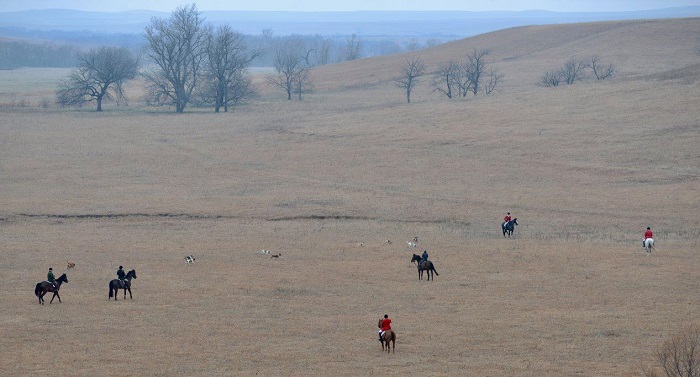 "Don’t like hobbles and I can’t stand fences; Don’t fence me in!" A song that could have been written in the tallgrass prairie of Kansas. / Julie Honsinger photo
"Don’t like hobbles and I can’t stand fences; Don’t fence me in!" A song that could have been written in the tallgrass prairie of Kansas. / Julie Honsinger photo
The MFHA Hark Forward Performance Trial Series took participants to the prairies of middle America, a unique experience. I love the traditional hunt countries on the East Coast with large forests and big open fields, and I also love the totally different experiences of hunting in land where it is so wide open you can literally see for miles in every direction. Here, in the wide open expanse of the Kansas prairie, field members get to see most all of the hound work.
Mission Valley Hunt (KS) hosted this Foxhound Performance Trial over the weekend of March 2–4, 2018. Five hunts from the Midwest competed. In addition to Mission Valley, hounds were entered from Bridlespur Hunt (MO), Fort Leavenworth Hunt (KS), Mill Creek Hunt (IL), and North Hills Hunt (NE). Guest huntsman was Angela Murray, MFH, Red Rock Hounds (NV).
Woodbrook Kent Is Grand Champion at Western States
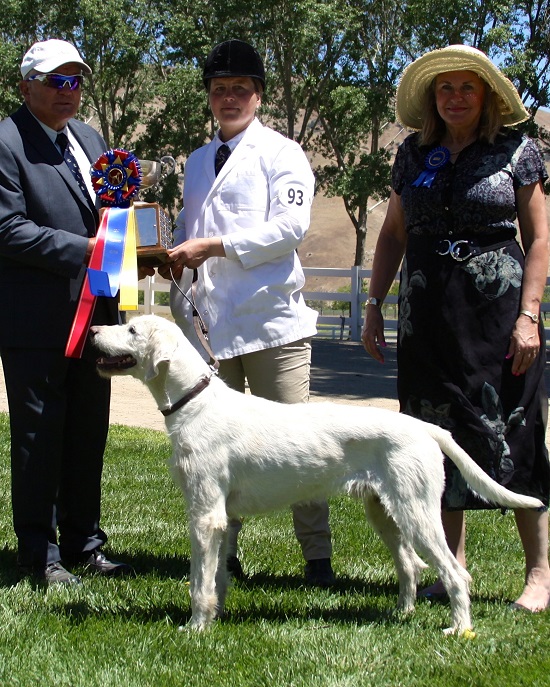 Huntsman Jennifer Hansen and Western States Grand Champion of Show Woodbrook Kent 2014. Judges are huntsman Larry Pitts and Mary Ewing, MFH. / Nancy Stevens-Brown photo
Huntsman Jennifer Hansen and Western States Grand Champion of Show Woodbrook Kent 2014. Judges are huntsman Larry Pitts and Mary Ewing, MFH. / Nancy Stevens-Brown photo
Honorary huntsman Jennifer Hansen credits the Woodbrook Masters who encouraged her to take hounds on a one-thousand-mile trip (each way!) from Washington State to Southern California to participate in the Western States Hound Show. It was the first time that Woodbrook had shown hounds in many years, and it was the first time Hansen ever showed hounds. And she took home the Grand Champion Foxhound of Show, Woodbrook Kent 2014.
“I was as nervous as I could be,” said Hansen, but “I was so proud of Kent who held his stern high all day. [Judge] Mr. Pitts said, ‘That hound just can’t stand bad!’”
A Cowboy in County Clare
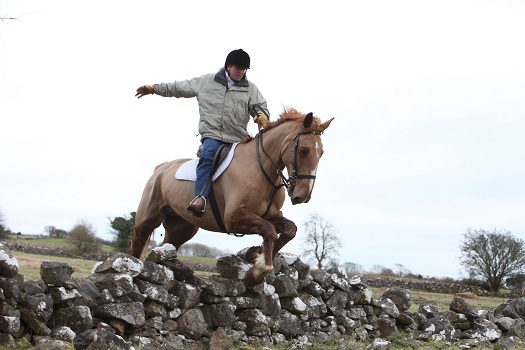 Kail Mantle from Montana: just like riding a bronc / Val Westover photo
Kail Mantle from Montana: just like riding a bronc / Val Westover photo
Last year, while hunting with the Red Rock Hounds (NV), I met Renee and Kail Mantle from Big Sky Hounds in Three Forks, Montana. Kail gave us a bucking horse lesson one day before hunting. This Montana cowboy, who hunts in chaps and cowboy hat, had sat calmly to his horse bucking crazily above the sagebrush and had seriously impressed me.
When a group of these Western foxhunters invited me to accompany them to Ireland this year, I jumped at the chance. These were fun people---more than a little crazy, and I wondered if anyone had warned the Irish!
I also wondered if my companions knew what they were getting into. I had hunted the big Irish walls and hedges in 2000, and I came home with newfound respect for anyone who hunts regularly in Ireland. It is challenging country, and their version of foxhunting is an excuse to run and jump really big fences.
The Red Rock Hounds and Their Country
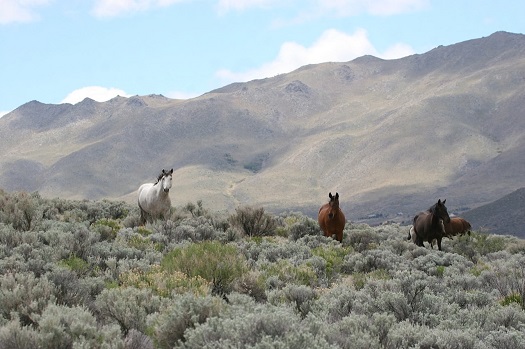 Wild horses in Nevada's high desert / Nancy Stevens-Brown photo
Wild horses in Nevada's high desert / Nancy Stevens-Brown photo
I want to tell you about Lynn Lloyd’s Red Rock Hounds and the country they hunt as a short introduction to our feature story, "How Old Hounds Pay Their Keep at Red Rock." In that story you’ll read how Lynn ingeniously transformed her elderly hounds from a burden to an asset! The old hounds pay their way by increasing membership and caps, and they throw off side benefits by helping to train young hounds and staff. And I have to believe that many hunts could do something similar to their own benefit.
The Red Rock foxhounds hunt the coyote over the high desert of Nevada, near Reno, where cowboys in dusty western hats, vests, and chaps lope after hounds in their Western saddles stirrup-to-stirrup with properly attired foxhunters posting to the trot in their English saddles.
How Old Hounds Pay Their Keep at Red Rock
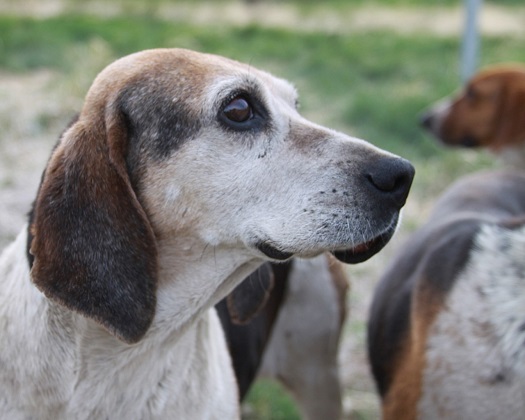 What to do with the old hounds? / Nancy Stevens-Brown photo
What to do with the old hounds? / Nancy Stevens-Brown photo
Most hunts are beset by similar problems: what to do with old hounds, how to attract more members, how to pay the bills, how to train staff, how to train young hounds. Lynn Lloyd, MFH and huntsman of the Red Rock Hounds (NV), found that the solution to one problem provided the key to solving several others.
What to Do with Old Hounds
The average hunting life of a hound is perhaps six or seven years. That means it is retired from the pack at age seven or eight. Beyond that age, most hounds start falling behind the pack, lacking the foot and endurance to maintain the pace over a full hunting day.
But with several years of life still remaining for the retired hounds, most hunts are hard-put to expend their limited financial resources to keep and maintain them. And here’s where Lynn Lloyd found a way to turn a burden into an asset.
How Old Hounds Pay Their Keep at Red Rock
 What to do with the old hounds? / Nancy Stevens-Brown photo
What to do with the old hounds? / Nancy Stevens-Brown photo
Most hunts are beset by similar problems: what to do with old hounds, how to attract more members, how to pay the bills, how to train staff, how to train young hounds. Lynn Lloyd, MFH and huntsman of the Red Rock Hounds (NV), found that the solution to one problem provided the key to solving several others.
What to Do with Old Hounds
The average hunting life of a hound is perhaps six or seven years. That means it is retired from the pack at age seven or eight. Beyond that age, most hounds start falling behind the pack, lacking the foot and endurance to maintain the pace over a full hunting day.
But with several years of life still remaining for the retired hounds, most hunts are hard-put to expend their limited financial resources to keep and maintain them. And here’s where Lynn Lloyd found a way to turn a burden into an asset.



